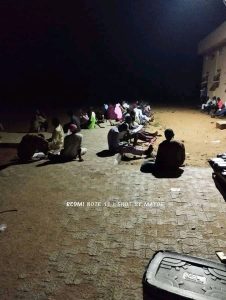By Isiaq Ibrahim

Abdullahi Ayub’s lifestyle toward education before he was admitted to study Agriculture in Usmanu Danfodiyo University, Sokoto was skunked by unseriousness. He was one of the most notorious truants among his mates, by academic performance and like gushy blood, red inks would flourish all over his results.
F9’s was an ally to Ayub’s result. His daily routine was to go to school; sit in class; and leave to play football without extending pity to what was taught in the classroom.
“Throughout my primary and secondary education, I had never read the way UDUS had made me do. When I was 18 during my senior secondary education days, I was one of the unserious students. All I do is come to school, attend class and leave for home to play football.
“In my result at the end of each term the minimum of F9 I do have is four (4),” he narrated.
Despite the evidence of F9’s, Abdullahi did neither see the results as a motivation nor the situation as high time he had to be serious about his academic career, not until he was promoted to SS3, where he met Kamaldeen, a quiet, tall and intelligent person with flair for learning, and ability to study and attend extramural classes.
“One day, during the break time, I walked towards the direction where he was watching a football match. In the middle of our conversation, he asked if I was interested in extra-lesson after the closing time.”
Continuing, “his words unstick in my head until a week later, when they crossed my mind. Then, I pocketed pride and shyness and decided to go to him. I started following him to the lesson where I started developing interest in reading,” Abdullahi recounted.
UDUS: The Home of Readers
Founded in 1975, located in the Northwestern part of Nigeria, Usmanu Danfodiyo University, Sokoto (UDUS), known as the most peaceful and toughest university in Nigeria.
In UDUS, reading is like cracking hard nuts with bare-hand. Perhaps, the fault should be tossed to the motto: “Iqra” – an Arabic word for “read” which makes the both serious and unserious types to activate reading.
When Abdullahi gained admission in UDUS, like he did in secondary school, he intended to read for the exam and pass. Not quite long when he realized that the University is kilometers far away from High School.
“It is here in UDUS, I read up to 10-hour daily. It was difficult for me during my 100-Level to read for those hours but with commitment and consistency, I was able to adapt to it,” said Abdullahi, adding that when it comes to reading Danfodiyo is the best. (Have he been to other varieties before?)
Another student, Abdulkareem Abddulrasheed, a 300-Level student of Faculty of Education and Extension Services asserted that when it comes to reading, tertiary institutions are exceptionally different from primary and secondary schools.
“Most of us were not after grade in basic school so we did not read thoroughly unlike in higher institutions where we are after class of degree. While studying is exceptionally different from that of primary and secondary school. I tried to adapt with the high level of seriousness because it is a must.
“The fact that those who read can still fail made me strengthen up to avoid carryover. It is not easy though, I am trying to get used to it,” he said.
Studying in UDUS Different
According to the weather spark report, Sokoto is in the dry Sahel surrounded by sandy savannah and isolated hills. With an annual average temperature of 28.3 °C (82.9 °F), Sokoto is one of the hottest cities in the world, however the maximum daytime temperatures are most of the year generally under 40 °C (104.0 °F), and the dryness makes the heat bearable.
Sanusi Ibrahim, a student of the Adult Education and Extension Services who stays off campus amidst different tribes noted that the language barrier and harshness of Sokoto weather are challenges.
“Sometimes not conducive for reading most especially during hot seasons where the weather is hot like hell. Also, when I resumed UDUS, the way others speak English is hard to decode,” he lamented.
While speaking with Dr. Murtala Akanbi Yusuf, a lecturer from Department of Adult Education and Extension Services, Faculty of Education and Extension Services said at the tertiary education level, students are trained to acquire necessary knowledge, skills and experiences that will make them perform more high level tasks and also the time, quantity and quality of what one reads is more demanding than one does at the basic education level.
“Reading is the foundation of literacy and essential for learning. Anyone who seeks knowledge, skills and information must engage in reading. This is why at all levels of education reading is considered as an important subject, particularly at the basic education level. This is to build the foundation for further learning,” he explained.
Speaking further, Dr. Akanbi advises students to take reading more seriously, because one’s reading exposure determines one’s knowledge and personality.
“As a student you should read with critical minds in order to discover truth and reality and understand vague and misinformation from what they read,” Adding “read widely and everything that comes your way. This will make them knowledgeable and scholars,” he commented.
